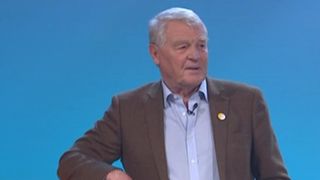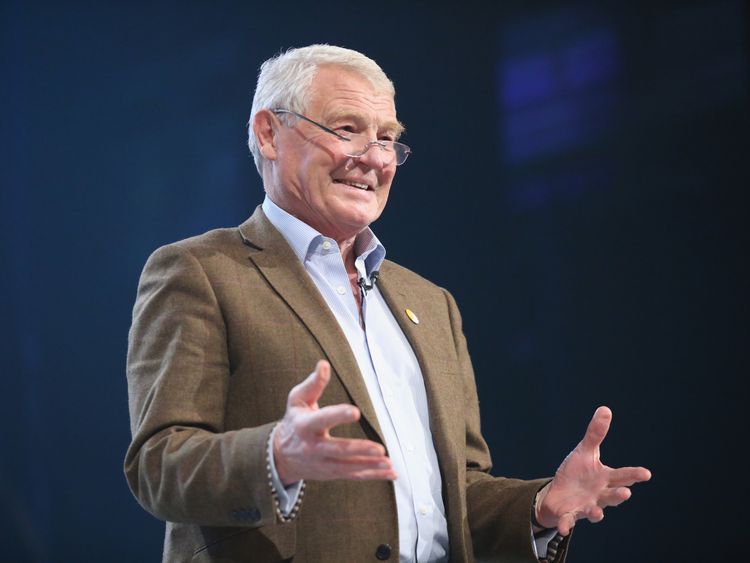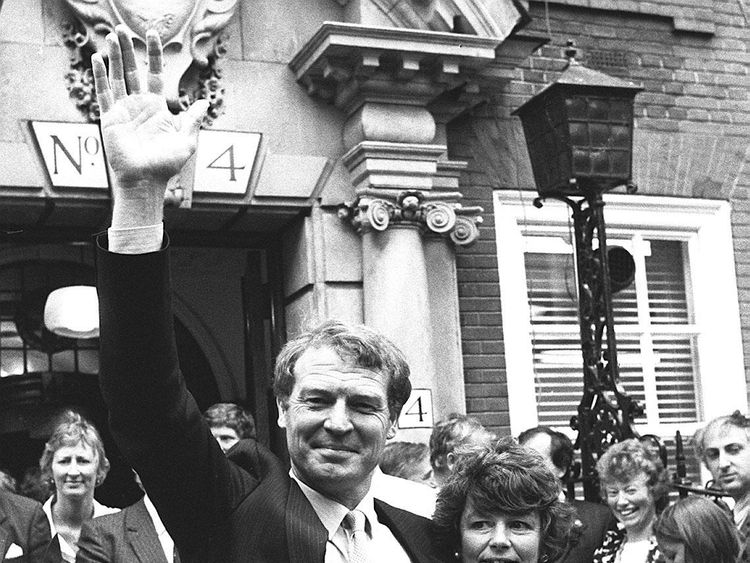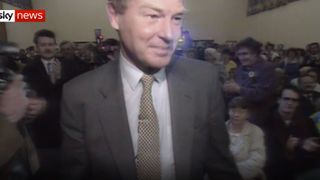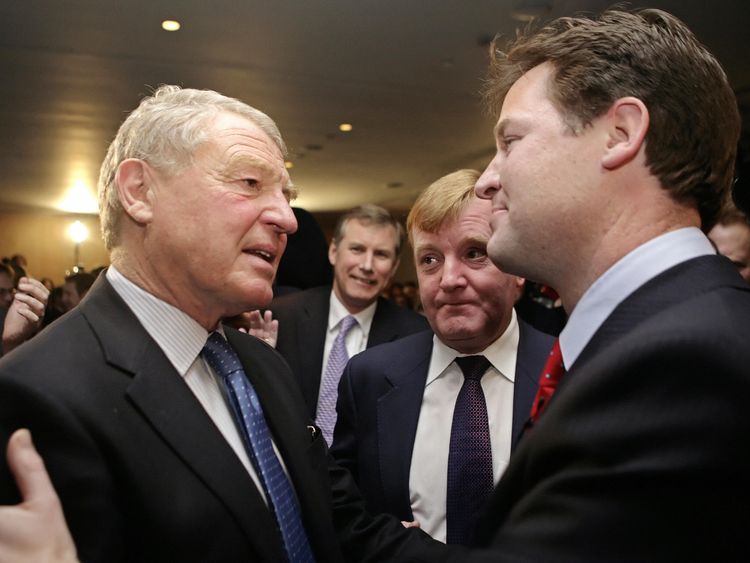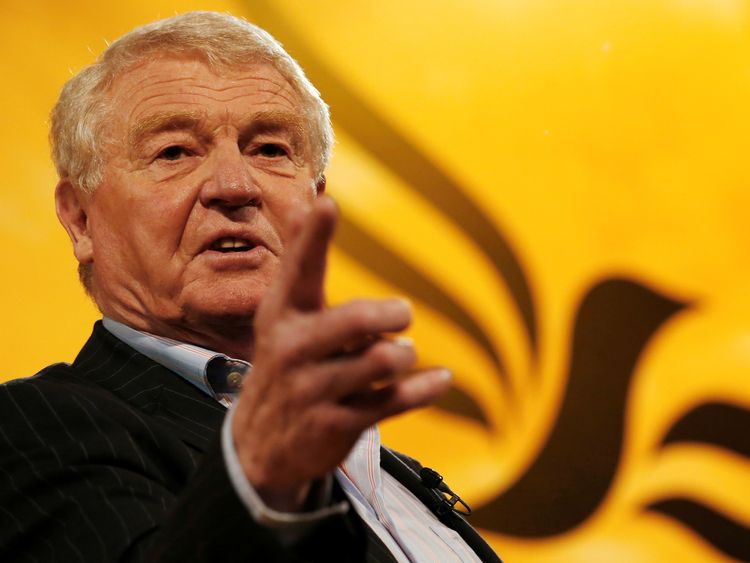 |
| Stanley Atkinson |
 |
| Paddy Ashdown |
For her, yesterday, on what should have been his 78th birthday, it must have been especially difficult to spend the first 27th February for 50+ years without his being there.
PIG-FARMING
Of the many things Paddy and I used to talk about, one that might surprise people was pig-farming.
When his father retired from the Indian army, he went back to Northern Ireland to run a pig-farm. My father was a mixed farmer who took special pride in his pigs which were called the Burbridge pedigree Wessex saddlebacks - one of which won the supreme championship at the Great Yorkshire Show.
 |
| Danish Landrace sow |
The Danes were so aware of their good luck in having a monopoly of ultra-lean bacon pigs that they did all they could to prevent the export of live Landraces.
But I digress, my father's realisation that he was going to have to go in for mass pig-production led him to Northern Ireland, where there were some pioneering pig-farmers. We went on a ferry to Belfast, where my mother had a friend whose husband was a marine engineer working at Harland and Wolf in Belfast building the aircraft carrier HMS Eagle.
So in 1950, while he was inspecting pig-farms in Northern Ireland, my mother, brother and I stayed in Belfast as tourists, which included visits to Stormont and the shipyards.
It would be nice to think that my father had met Paddy's father on his tour of pig-farms, but the dates mean that we must have been there there before the Ashdown family came home from India.
ENLIGHTENED FARMER
Stanley Atkinson went to the King's School in Pontefract and would have dearly loved to have been allowed to stay on there a bit beyond than the then official school-leaving age of 14. But Grandpa Atkinson had other ideas, namely to make his own oldest child work on the farm for £0.00 a week. So, for the 16 years until he was 30 (when he married my mother in 1941), he worked six days a week for his keep + no wages. If he needed to go into a local town to buy new clothes (or anything else), he had to ask my grandmother to give him some cash.
By the time he reached his twenties, his frustrated brain had led him to become actively involved in attending local WEA (Worker's Education Association) lectures and, by the time my older brother and I were born, he'd amassed large numbers of non-fiction paperbacks and biographies and was genuinely self-educated.
He was also keen that his own sons would have a better education than he'd had, that they could stay at school as long as they liked and, if they passed the right exams, could go on to a university to study whatever they wanted - which is exactly what my brother and I both did.
At a time when so few youngsters went to university, our good fortune as 'sons of the soil' was itself quite exceptional. Years later, after I'd become a professional sociologist, I did a survey (from memory) of the other 50 sons of farmers I'd known as a child. Apart from my brother and me, the number of others who went to a university was one - who (surprise, surprise) was a younger son, whose older brother left school at 16 to work on and eventually take over the family farm (which is exactly what the other 94% also did).
ENLIGHTENED LOCAL POLITICIAN
For much of my childhood, Cllr. Stanley Atkinson represented Burton Salmon on the long since defunct Osgoldcross Rural District Council, of which he eventually became Chairman. Underneath our farmland were seams from a local coal mine, four miles away was a new Ferrybridge power station with chimneys and cooling towers, there was as canal and a navigable waterway (the River Aire), railways, potteries, factories and chemical works. It was, in other words, a rural district council of an area that was both urban/industrial (represented mainly by Labour trades unionists) and rural/agricultural (represented mainly by farmers).
Although he knew that most voters assumed that all farmers were Tories, he always insisted on standing for the council as an Independent. If you asked him why, his answer was that tribal party politics had little or no relevance for the burning local issues on which members of the council made decisions. "If a Tory member backs a new bus-shelter for his village, Labour members will oppose it. If a Labour member wants street-lighting in theirs, the Conservatives will oppose it. But what really matters is what the local constituents actually want."
He was took special pride in the fact that, while he was the village's representative, they not only got both street-lighting and a new bus shelter, but new council houses as well. Because he really was Independent Labour and Conservative councillors repeatedly elected him as their chairman. But his only attempt to graduate to the County Council was thwarted by corrupt practices elsewhere in our area where an infamous local architect with offices in Pontefract lived, namely John Poulson.
When I went canvassing for my father - knocking on local doors beyond the village, distributing leaflets (for which, as an Independent, my father had paid for himself) - the standard reply to my offer to tell them more about what a brilliant job he'd done for the Osgold Cross Rural Distract council was along the lines of: "Don't bother, son - I don't want to hear about another Poulson crony like him and never vote Tory anyway!"
The only political connection he ever had with Poulson were in his official capacity as a member of the Osgoldcross Rural District Council which had to deal with a planning permission application from him to build an extremely expensive and ultra-modern house in Darrington which ORDC had granted it (*see below line for reminder about the Poulson Affair - with thanks to Professor Robert Williams, University of Durham https://www.robertwilliams.co.uk/images/PDF/poulsonaffair.pdf).
I realise now that I was still in my teens when I first saw that being an enlightened, rational and sensible politician is no guarantee of success.
NEW INDEPENDENTS, NEW PARTY, OR AMALGAMATION WITH THE LibDems?
At a time when some Labour and Tory M.P.s have left their parties to join a new independent group (see previous blogs), I found myself wondering on their birthday how Stanley Atkinson and Paddy Ashdown would have reacted to these defections.
I'm fairly certain my Stanley Atkinson, as a long-committed Independent would have thoroughly approved of recent events, whereas Paddy Ashdown would have rather they'd joined the LibDems.
My own view, for what it's worth, is that the new Independents and the LibDems should definitely get together about getting tgdghd, who are far from what they used to be during the Ashdown leadership. But it is still a fairly efficient party with a lot of members in every part of the UK willing and able to canvas for a party that isn't Labour or Conservative.
And, without a Poulson scandal lurking in the background, it's unlikely they'd get the kind of unhelpful response that greeted me on the doorsteps when canvassing for an excellent candidate in the early 1960s.
___________________________________________
*The Poulson affair revealed a web of corrupt transactions which took place in Britain in the 1960s and 1970s and embraced dozens of councillors in numerous local authorities across the country as well as several MPs. The ensuing scandal exposed aspects of the conduct of public life which shocked and surprised many British citizens. This conduct had largely escaped the attention of both the police and the mainstream media. The Poulson Affair, if it did nothing else, helped to make claims of British assertions of superiority regarding corruption seem rather hollow.
The main figures in this drama were John Poulson, an unqualified architect from Pontefract, Yorkshire, and a key associate of his, T. Dan Smith, the leader of Newcastle City Council , and although many others were involved, these two were the ones who attracted the most public and media notoriety.
___________________________________________



